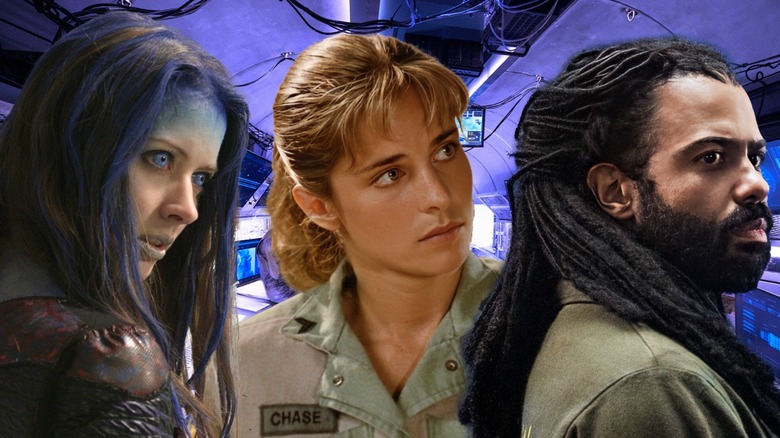
Science fiction TV shows have a shorter shelf life than cryptocurrencies and social media influencers. What gives? It's not that complicated: big budgets + low ratings = cancellation. Hey, those space-age sets and costumes, alien makeup, and CGI aren't cheap. Meanwhile, passionate fans may sign petitions by the thousands, but ratings are what matters, and those fanbases are too small to impress execs trying to court advertisers.
Given the economics of television, it's not shocking TV studios routinely dump pricey sci-fi shows in favor of the newest "Big City Cop Show" procedural. To be honest, it's surprising sci-fi shows get made at all. Yep, it sucks, but that's show business. While it's easy to explain why most sci-fi TV shows get canceled, the reasons for some cancellations are downright baffling. These include sci-fi shows that were dropped despite decent ratings, canned with fully completed seasons, or even dumped after inspiring hunger strikes! Yeah, it's wild. Whether you love these sci-fi shows or can't stand them, you have to admit they were canceled for the strangest reasons.
The Adventures Of Superboy
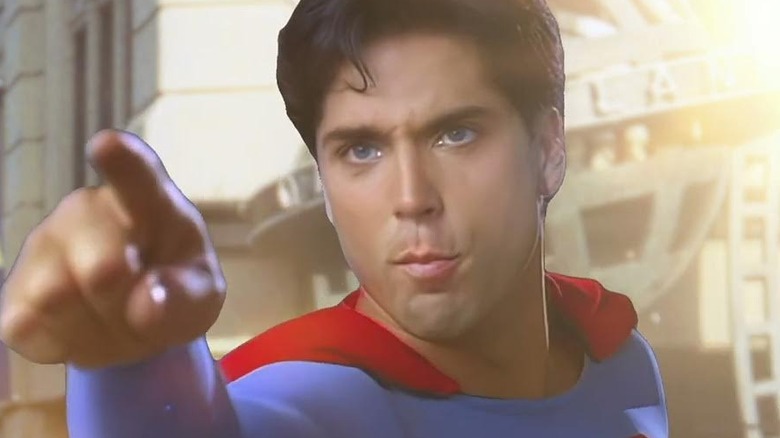
Look! Up in the sky! It's a bird! It's a plane! It's a ... cancellation notice? Thirteen years before "Smallville," there was another show about Superman's early years. "Superboy" (renamed "The Adventures of Superboy" during the third season) ran for four seasons and 100 episodes in syndication from 1988 to 1992. While "Smallville" was DC with a dash of "Dawson's Creek," "Superboy" showcased Clark Kent as a young adult getting started in Metropolis (which looked remarkably like Orlando).
John Haymes Newton played the Big Blue Boy Scout in Season 1, but Gerard Christopher donned the red and blue starting in Season 2. It might have been because Newton potentially violated his contract's morality clause by getting arrested for public drunkenness (didn't they see "Superman III?"). Ratings were strong during Christopher's run, but Warner Brothers pulled the plug — and not because Lex Luthor took over as studio chief. In an interview on Superman Homepage, longtime Supes producer Ilya Salkind claimed Warner Brothers canceled "Superboy" (as well as a proposed "Superman V") to focus on "Lois & Clark: The New Adventures of Superman." As opposed to syndication, "Lois & Clark" was set to fly much higher with a primetime slot on ABC. This resulted in truth, justice, and the American way — lawsuits! Warner Brothers filed a lien on the series, Salkind sued, and "Superboy" was benched, leaving the airwaves and not arriving on any home media (save bootleg copies) until 2006. So Superboy was defeated by Superman. Bizarro, right?
Firefly
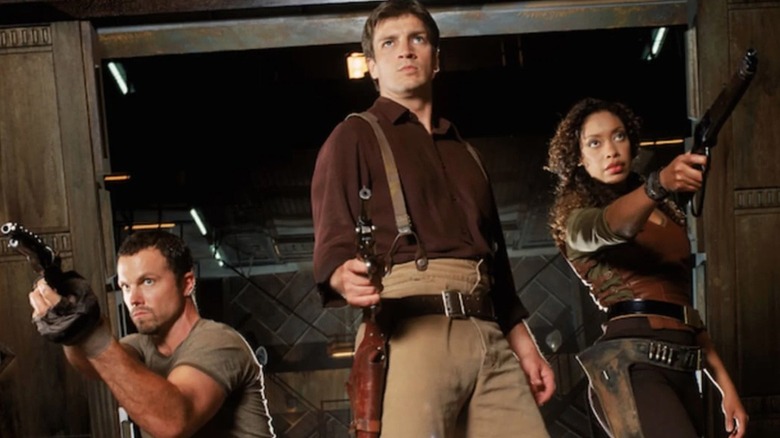
"Firefly" is the poster child for cult shows canceled because the studio suits never got it. While there's nothing strange about that, the way Fox executives handled "Firefly" was downright baffling. Despite coming from "Buffy The Vampire Slayer" creator Joss Whedon, Fox refused to pick up the show unless Zoe (Gina Torres) and Wash (Alan Turdyk) weren't married. It turns out that execs wanted to 'ship Zoe with Nathan Fillion's Malcolm "Mal" Reynolds, but Whedon stuck to his guns. Fox picked up the show despite Zoe and Wash staying married, but the studio's chronic nitpicking was just getting started.
Unfortunately, Fox was so busy telling Whedon how to do his job they didn't focus on doing theirs. In the process, two very important details were overlooked — marketing and distribution. "Firefly" was aired out of order after Fox demanded a reshoot of the pilot episode, leading to general audience confusion (go figure). More critically, "Firefly" was marketed as a wild-and-wacky sci-fi comedy, not a space Western. There was humor in "Firefly," but that's like promoting "The Dark Knight" as a witty comedy about an urbane playboy and his butler. Not surprisingly, "Firefly" lasted only one season and 14 episodes before Fox called it quits. Surprisingly, "Firefly" got a cinematic sequel in 2005's "Serenity," though it bombed big time, making just $40 million worldwide on a $39 million budget. While it's unlikely "Firefly" was destined to be a huge hit, Fox's bungling was just plain bizarre.
The Secret World Of Alex Mack
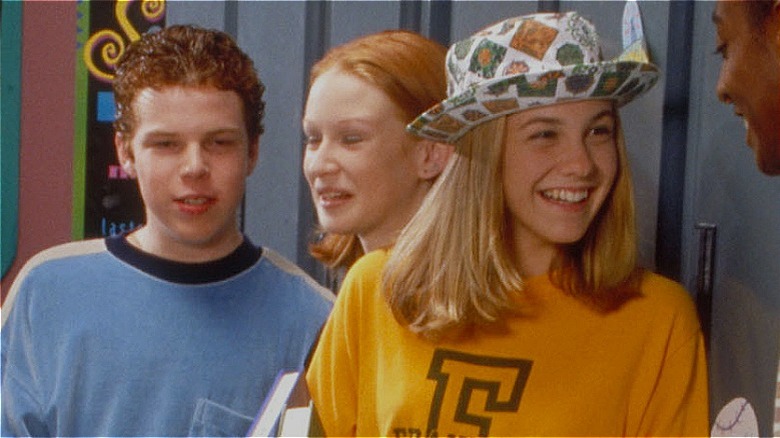
If you're "SNICK years old," you remember such classics as "Are You Afraid of the Dark?" "Clarissa Explains It All," "All That," and "The Secret World of Alex Mack." "Alex Mack" was about a teen girl who gained superpowers after being exposed to chemicals. To play this super-powered youth, Nickelodeon auditioned 600 hopefuls before settling on Larisa Oleynik. Oleynik carried the series like one of her character's signature hats for four seasons and 78 episodes from 1994 to 1998. After working so hard for so long, the teenage star was burned out and wanted to call it quits.
According to a retrospective in HuffPost, series co-creator Thomas W. Lynch took Oleynik, her mom, and her manager to a fancy Hollywood restaurant, where he pulled out all the stops to get her to return. His offer included a feature film and a lot of money, but Oleynik still said no. Oleynik said she wanted to finish high school, go to college, and "keep it innocent" after Alex Mack got a boyfriend in the fourth season. Nickelodeon realized they couldn't recast or replace Alex Mack, so they pulled the plug, ending the show with a cliffhanger. We're not sure which is stranger, a young star turning down fame and fortune to live a normal life or a major TV network canceling a show while it was still super popular.
Clone High
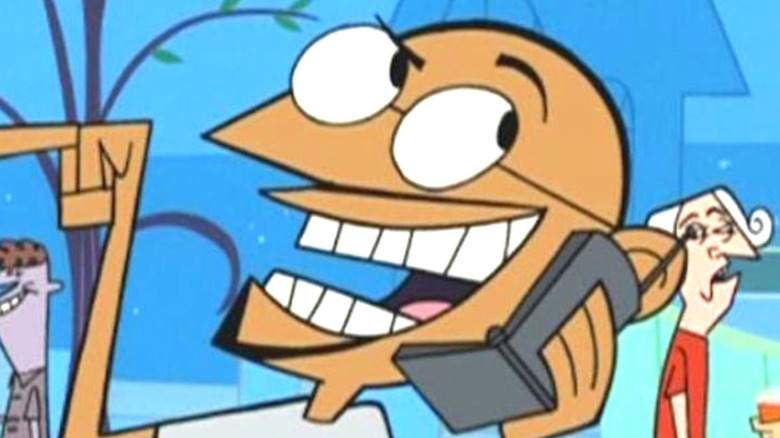
Long before Phil Lord and Christopher Miller were winning Oscars and getting fired, the dynamic duo created the cult classic cartoon "Clone High." The premise: The clones of historical figures reimagined as teens. The all-star lineup included JFK, Abe Lincoln, Cleopatra, St. Joan of Arc, and Gandhi, aka G-Man. G-Man was a fast-talking, junk food-eating, horny sidekick who had more in common with Steve Stifler than the anti-colonial Indian nationalist. Granted, none of the characters were respectful. Lincoln was a lonely, lovesick loser; Cleopatra was an attention-seeking hot girl; and JFK was a skirt-chasing cool dude (okay, that may have been accurate). Alas, it was G-Man who got "Clone High" expelled from TV, according to Lord and Miller.
Despite "Clone High" never airing in India, protesters heard about the show on the internet. A large gathering, including 150 politicians and Gandhi's grandson, held a hunger strike in front of MTV's India offices, trapping Tom Freston, the then-CEO of MTV's parent company Viacom, inside the building. "They basically threatened that they'd revoke MTV's broadcasting license in India if they didn't take the show off the air," said Miller. Lord and Miller pitched a few concepts for a second season without G-Man being Gandhi (including one where he was revealed to be a Gary Coleman's clone), but Viacom was over the whole odd ordeal. Fans may get a happy ending, as Miller tweeted that "Clone High" will return on HBO Max.
Escape From Jurassic Park
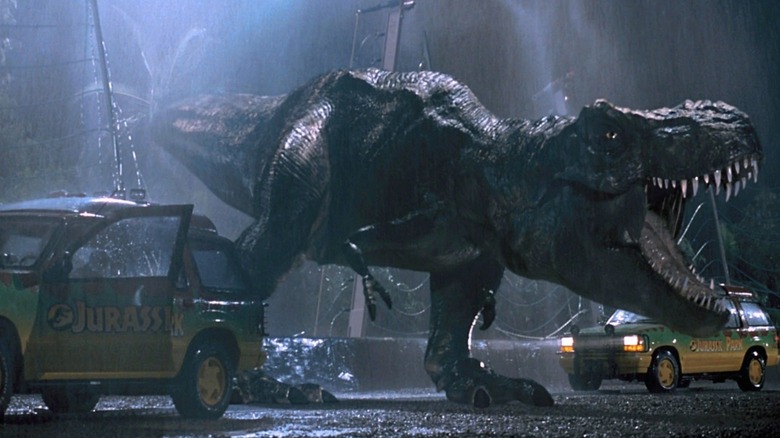
A "Jurassic Park" animated series in the '90s would have ranked in the top 5 of the coolest things ever. It almost happened, according to longtime dinosaur artist William Stout. Stout was set to work on "Escape From Jurassic Park," which he says would have been "heavily inspired by European and German comic book series." While watching "Escape From Jurassic Park" on Saturday mornings and consuming our third bowl of sugary cereal sounds like the best, Stout says the series was actually destined for primetime. "It was not gonna be a kiddie show," explains Stout
The producers got as far as shooting a trailer, but they still needed the blessing of one man. You might have heard of him — Steven Spielberg. Unfortunately, something unexpected and, frankly, baffling happened. Spielberg said no. The Oscar-winning blockbuster hitmaker backed out because he was over "Jurassic Park" merchandising and marketing. According to Stout, Spielberg "just said, 'Nah, I don't even wanna do it.'" No Spielberg, no show. We're glad the internet wasn't really around back then because we would have been crushed. While we can see where Spielberg is coming from, the fact that a surefire smash hit "Jurassic Park" cartoon went extinct because he didn't want to deal with marketing is super strange.
Snowpiercer
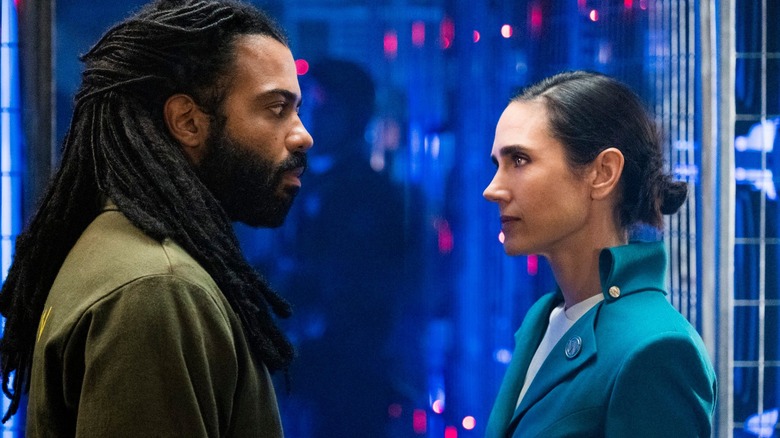
Original sci-fi is just as risky on film as it is on TV. So it wasn't surprising that 2013's "Snowpiercer," which only made $86 million worldwide on a $40 million budget, didn't get a cinematic sequel. What was surprising is that it got a TV show instead. "Snowpiercer" debuted as the No. 1 new scripted drama on all ad-supported cable in 2020. To translate that sentence from media speak to real talk, "Snowpiercer" was good for cable network TNT — until it wasn't. Despite their much-ballyhooed "We Know Drama" brand, "Snowpiercer" was TNT's last remaining scripted drama when it was canceled in 2022. In early 2023, it was announced that "Snowpiercer" wasn't just canceled. It was buried.
According to Deadline, the fourth season of "Snowpiercer" was not going to be aired on TNT — or anywhere. Instead, it was shelved as a tax write-off for parent company Warner Brothers Discovery. While production company Tomorrow Studios was hoping to find a home for the fourth season as well as potential prequels and sequels, it appears the end is here for the post-apocalyptic drama. "Snowpiercer" started as a film, became a TV show, and died as a tax write-off. While this once-unprecedented practice has become common today, in the history of TV, it's pretty strange.
Invasion
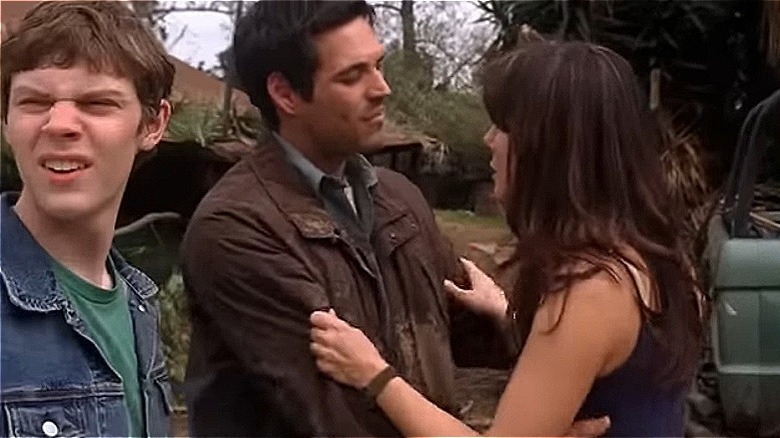
Sci-fi had a renaissance on primetime network TV following the monumental success of "Lost." From "Heroes" to "FlashForward" to "Fringe," most of these shows got canceled because of low ratings and high costs. However, it's still a mystery why "Invasion" got canned. Similar to "Invasion of the Body Snatchers," the series was about a small Florida town whose residents are replaced by mysterious creatures. Despite airing on ABC, the same network as "Lost," "Invasion" only ran for one 22-episode season from 2005 to 2006 before the network canceled it.
The reason? In a 2014 interview with AV Club, "Invasion" actor Tyler Labine laments, "I still to this day don't know why that show got canceled. We had great numbers, we had a good show, good critical acclaim ... I don't know." But in 2011, Labine told bullz-eye, "The funny thing is, 'Invasion' did get lots of love. Critics loved it. There was quite a huge following by the time we got canceled. It was just the network didn't love it, that's all." And in 2019, Labine told StarryMag, "['Invasion'] was a big hit that got canceled for some reason that nobody understands. Purely politics. The ratings were through the roof." Good ratings, strong reviews, and fan support — what happened? Going by what Labine says, it seems that "Invasion" got axed simply because it wasn't "Lost."
Angel
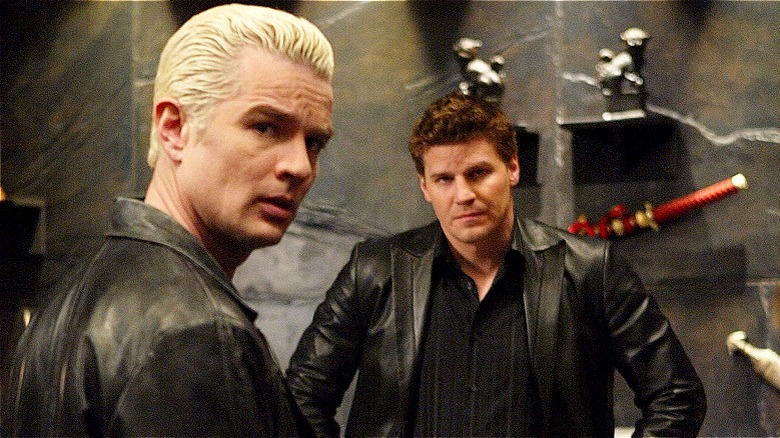
"Buffy The Vampire Slayer" was a big hit for The WB, so the network commissioned series creator Joss Whedon to produce the spin-off "Angel." In the show, "Buffy" villain Angel goes to "the City of Angels," seeking redemption. Going to Los Angeles for redemption doesn't make sense to us either, but that's not even the strangest part. "Angel" ran for five seasons and 110 episodes and probably could have gone longer had Whedon not overplayed his hand. Despite the show's high ratings, critical acclaim, and fan support, The WB was a noncommittal boyfriend. Every year, the studio delayed picking up "Angel" until the last minute, just in case another potential hit was out there. Consequently, the cast and crew would turn down jobs, crossing their fingers that "Angel" would continue, while the creative team was under the gun to produce a new season at the 11th hour.
According to "Angel" writer David Fury, Whedon asked The WB's CEO Jordan Levin for an early pick-up. "Jordan, sort of with his hands tied, with his back up against the wall, called him the next day and said, 'Okay, we're canceling you,'" Fury says. "There was a power play ... we forced them to make a decision, and with his hand forced he made the decision to cancel us." That bites for fans and even more for The WB, who Fury says regretted the decision. Oddly enough, pressuring your boss for more flexibility is a bad idea, even if you're Joss Whedon.
The Twilight Zone
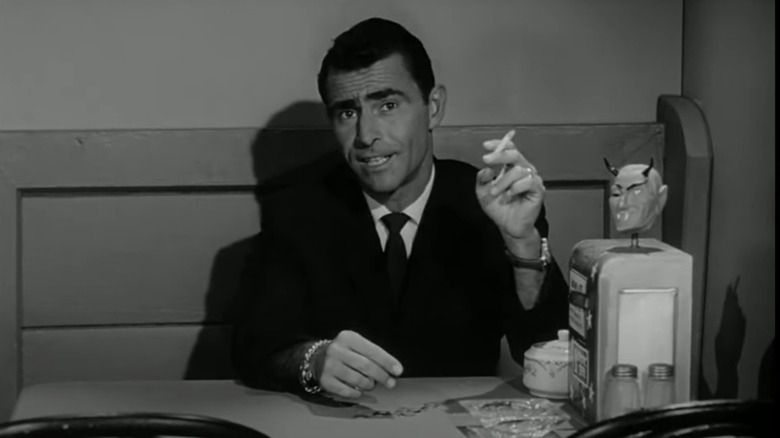
"The Twilight Zone" is one of the most iconic television shows of all time — science fiction or otherwise. For five seasons, this trailblazing anthology series tackled contemporary issues and timeless subjects through its unique blend of sci-fi, horror, black comedy, and absurdism. The show could address challenges in our dimension because it was set in another one — the titular Twilight Zone. Series creator and showrunner Rod Serling probably wished he was in another dimension, too.
Today, Serling is considered one of the most brilliant TV writers ever, but one person he didn't impress at the time was his boss, CBS executive James T. Aubrey. When "The Twilight Zone" lost sponsors in its fourth season, Aubrey didn't bother to secure new ones but canceled the show and replaced it with the comedy "Fair Exchange." After "Fair Exchange" fizzled, Aubrey quickly ordered a fifth season of "The Twilight Zone." By this point, Serling was suffering from burnout, while the show suffered from so-so ratings. After the fifth season, Aubrey canceled "The Twilight Zone" once and for all. Canceling a popular TV show, bringing it back, then dumping it again sounds like a plot straight out of "The Twilight Zone."
Read this next: 12 Underrated Sci-Fi Shows That You Need To See
The post Sci-Fi Shows That Were Canceled For The Strangest Reasons appeared first on /Film.
